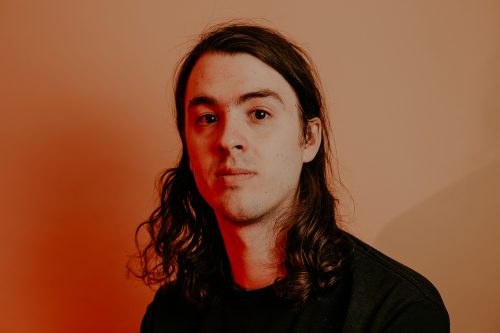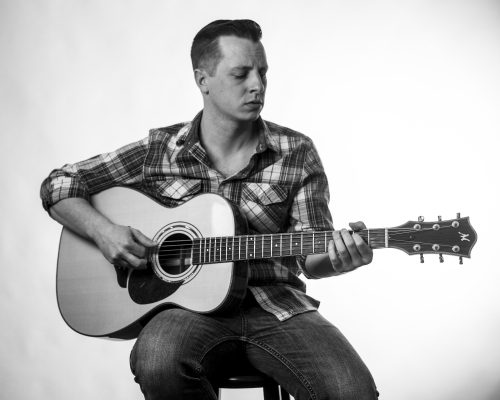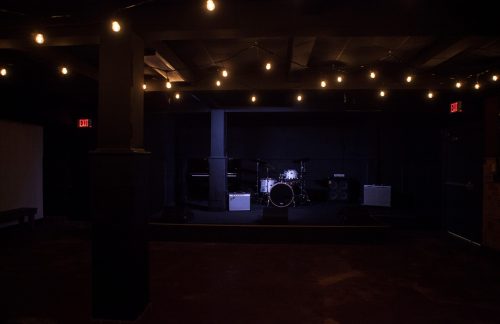Glitterer, a relatively new project for Title Fight’s Ned Russin, is the result of the musician challenging himself. Russin, who plays bass and sings for the internationally touring post-punk band from Kingston, Pa., started poking around with a MIDI controller.
“A couple years before that I wrote a batch of songs but never could quite finish them, and the instrument literally sat in a drawer in my desk and I kind of forgot about it,” says Russin. “And around May of 2017 I kind of had a bit of free time and had the desire to do something new and picked it up again without any really specific intentions in mind, besides trying something that I thought was good.”
With the MIDI (musical instrument digital interface) keyboard, he explains, “There’s a very specific sound that I made, and I feel like the first batch of songs was me figuring out how that’s supposed to sound and I can tinker with it.”
Several shows and two releases in, Glitterer continues to take form and is a priority for Russin, who says he does not have an update on Title Fight, which been dormant since touring in support of 2016’s “Hyperview” album. Glitterer will perform Thursday night at Karl Hall in Wilkes-Barre.
Russin released the first Glitterer EP in 2017 and put out its first full-length album, “Looking Through the Shades,” last month. While he started Glitterer in New York City, where he attended Columbia, and recently moved to Washington, D.C., Russin tracked the new album at his family home in Kingston. Russin worked alone for the EP but says he “wanted to have other people in the room with me” for the LP. His brother, Ben, played drums, and Alexander Giannascoli — aka (Sandy) Alex G — and Arthur Rizk coproduced. Like “Hyperview,” it was released on the venerable indie label Anti-.
When touring the EP, Russin pulled out the vocals from the finished recordings and used the backing tracks as the basis for the live songs. Now that he has two releases, which were recorded differently, he’s doing it a bit differently.
“With the new record having new instrumentation and amps and real drums, I basically went into the demos I made before the LP and kind of built the songs again because there’s a discrepancy between the sonics of the new record and the sonics of the old record,” he says.
“So I basically rebuilt everything and use those, mesh it all together and make a setlist out of that,” he continues. “I try to have it flow pretty nonstop. I think the songs are short and the energy is good, and I don’t want to lose that.”
Russin says he’s enjoyed the process of presenting a whole new side of himself on stage to listeners who know him from a hard-charging rock band.
“I still feel nervous — I do for every show — but I don’t feel nervous that I don’t know what I’m doing,” he says. “It’s obviously not the kind of energy where people are jumping off each other. … I can tell when people are looking at their friends, unsure what they’re doing there and if I’ve lost it, and I can see when they kind of start to get it and start listening to the music, and I think that’s part of this project and part of the challenge of doing it.”
The Karl Hall show presents an opportunity for Russin to return to NEPA, where Title Fight, as well as bands like Tigers Jaw and The Menzingers, got their start in an all-ages, DIY scene before rocketing to major tours and recognition well beyond their small-town roots.
“I think the best thing the area provided us with was boredom,” says Russin. “I think being in a place where we had to make our own fun made us practice a lot and made us have shows that were kind of crazy in a way, because what else are we going to do? There was nothing else for us to do. We couldn’t go to the bar. I guess you could go to a movie or something. Either go to a show and make your own music, or do nothing.
“We were trying to write stuff that people react to and feel and get behind. It was more than just entertainment. It wasn’t we were just trying to fill our time. We were trying to figure out who we were and say something about it and not feel like we had to do what everyone else was doing or act how everyone else was acting.”




Leave a Reply